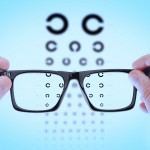
People with learning disabilities are 10 times more likely to have serious sight problems than other people and if people have severe or profound learning disabilities, the likelihood of having sight problems is further increased.
The difficulties are compounded of course when people may not know they have a problem and may not be able to express the problem to people who might be able to help.
It is estimated that 6 in 10 people with a learning disability need glasses and that many of these people will need support to get comfortable with wearing them and using them.
It is recommended that people with learning disabilities have a sight test every two years and in some circumstances, this needs to happen more often.
Standards published
Last month, the Royal College of Ophthalmologists published a set of quality standards for services for patients with learning disabilities which aim to provide a framework for judging how well the clinical service is working.
The standards are in the form of a draft self-assessment tool for cataract, glaucoma, diabetic retinopathy, children and young adults, oculoplastics, age-related macular degeneration (AMD) and vitreoretinal surgery services.
The approach is to try to identify through the use of the tool areas where problems are likely to show if the service is under stress.
The college points out that it is unlikely that many clinical services will achieve a perfect score, but that the aim to use the tools to identify areas for quality improvement.
Self assessment tool
The questions look at the effectiveness of the service, the patient experience and safety and cover issues like whether there is an available nominated lead for learning disability, alert systems to enable reasonable adjustments to be made, proactive use of communication tools like hospital passports, consent to treatment protocols and appropriate communication methods for outcomes of assessment and treatments.
The standards are currently in draft form and the college is running a consultation exercise currently, but any approach to self assessment that is carried out diligently and in the spirit of learning and continuous improvement has the capacity to drive up standards.
Links
Seeability guide for GPs on vision and people with learning disabilities

Quality standards aim to improve clinical ophthalmology services to people with learning disabilities http://t.co/GLF6R9yzd0
College quality standards aim to improve clinical ophthalmology services to people with learning… http://t.co/pf4WFi9IPN